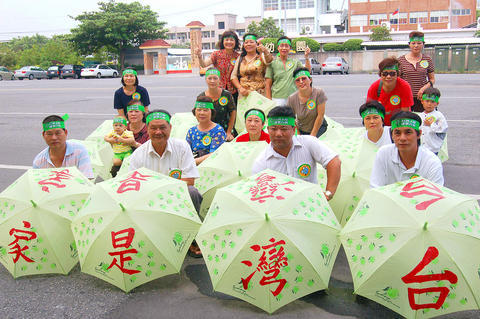Taiwan's application for UN membership represents the political will to self-determination of all Taiwanese people, and the UN, the US and the international community should support the idea that the nation belongs in the UN, US academics said yesterday.
As Article 55 of the UN Charter stipulates that the organization respects self-determination of peoples and promotes human rights, the UN General Assembly and the Secretariat have no right to reject Taiwan's application, Jordan Paust, a law professor at the University of Houston, said in an address to a conference on Taiwan's UN application hosted by the Taiwan Foundation for Democracy in Taipei yesterday.
"Taiwan functions as an independent state and it is time for Taiwanese self-determination to ripen into a far more widely recognized statehood status for Taiwan and membership in the United Nations," he said.

PHOTO: HUANG MING-TANG, TAIPEI TIMES
Citing Article 55 and Article 100 of the UN Charter, which states that the Secretary-General and the staff "shall refrain from any action which might reflect on their position as international officials responsible only to the Organization," Paust accused the UN Secretariat of violating its mandate when it returned Taiwan's application in July.
President Chen Shui-bian (
Chen's letter to the UN General Assembly protesting Ban's move earlier this month was also rejected.
Paust condemned the UN General Assembly and the Secretariat, and said that China, as a member of the UN, had no authority to deny Taiwanese people self-determination and human rights by vetoing the nation's membership application.
Although the International Court of Justice has not found any Security Council decision to be ultra vires ("beyond its powers") under the Charter, Paust said that Taiwan should ask its allies to demand that the UN General Assembly request an advisory opinion from the International Court of Justice on the propriety of a particular decision of the Council or an attempted veto by one of its permanent members.
Joining Paust in support of Taiwan's application, Dennis Hickey, a professor of international affairs at Missouri State University, called on US President George W. Bush's administration to employ "quiet diplomacy" and assist Taiwan with its UN application.
"The US should gently nudge other countries, including China, toward the idea that Taiwan belongs in the UN -- if only as an observer or non-state actor," he said.
As a creative strategy to help Taiwan be accepted as a UN member, Hickey urged the US to have other countries introduce a resolution to support Taiwan's participation as an "observer" under the name of "Chinese Taipei" at the same time when Taiwan submitted its proposal to join the UN as "Taiwan."
While the Democratic Progressive Party's (DPP) UN application may be rejected, the resolution should be a solution to resolve the thorny Taiwan representation issue and create a "win-win-win" situation for Chen's government, the Chinese Nationalist Party (KMT) and China, Hickey said.
"Any resolution will require new thinking, compromise and multilateral cooperation among numerous governments," he said.

Alain Robert, known as the "French Spider-Man," praised Alex Honnold as exceptionally well-prepared after the US climber completed a free solo ascent of Taipei 101 yesterday. Robert said Honnold's ascent of the 508m-tall skyscraper in just more than one-and-a-half hours without using safety ropes or equipment was a remarkable achievement. "This is my life," he said in an interview conducted in French, adding that he liked the feeling of being "on the edge of danger." The 63-year-old Frenchman climbed Taipei 101 using ropes in December 2004, taking about four hours to reach the top. On a one-to-10 scale of difficulty, Robert said Taipei 101

Nipah virus infection is to be officially listed as a category 5 notifiable infectious disease in Taiwan in March, while clinical treatment guidelines are being formulated, the Centers for Disease Control (CDC) said yesterday. With Nipah infections being reported in other countries and considering its relatively high fatality rate, the centers on Jan. 16 announced that it would be listed as a notifiable infectious disease to bolster the nation’s systematic early warning system and increase public awareness, the CDC said. Bangladesh reported four fatal cases last year in separate districts, with three linked to raw date palm sap consumption, CDC Epidemic Intelligence

Two Taiwanese prosecutors were questioned by Chinese security personnel at their hotel during a trip to China’s Henan Province this month, the Mainland Affairs Council (MAC) said yesterday. The officers had personal information on the prosecutors, including “when they were assigned to their posts, their work locations and job titles,” MAC Deputy Minister and spokesman Liang Wen-chieh (梁文傑) said. On top of asking about their agencies and positions, the officers also questioned the prosecutors about the Cross-Strait Joint Crime-Fighting and Judicial Mutual Assistance Agreement, a pact that serves as the framework for Taiwan-China cooperation on combating crime and providing judicial assistance, Liang

US climber Alex Honnold left Taiwan this morning a day after completing a free-solo ascent of Taipei 101, a feat that drew cheers from onlookers and gained widespread international attention. Honnold yesterday scaled the 101-story skyscraper without a rope or safety harness. The climb — the highest urban free-solo ascent ever attempted — took just more than 90 minutes and was streamed live on Netflix. It was covered by major international news outlets including CNN, the New York Times, the Guardian and the Wall Street Journal. As Honnold prepared to leave Taiwan today, he attracted a crowd when he and his wife, Sanni,